Curd calorie, it is very important to know about calories in curd. Be it a regular thali at home or a full course meal at some restaurant, food seems incomplete without a bowl of curd. Curd, Yogurt, or Dahi is an indispensable part of any Indian’s diet. That’s why it is a very crucial thing to know about calories in curd.
Curd is well accepted by people of almost all age groups because of its taste, easy digestibility, and the nutrients present in curd. Being rich in probiotics, a serving of curd is helpful in several ailments like diarrhea, lack of appetite, and many other stomach-related problems.
There are endless varieties of curds available in the market nowadays. Calories in curd mostly depend on the content of sugar and fat they contain hence there is a difference between calories in low fat or fat-free curd and whole milk curd calories. Let’s discuss the curd calories, the nutrition content of curd, curd benefits, and curd side effects.
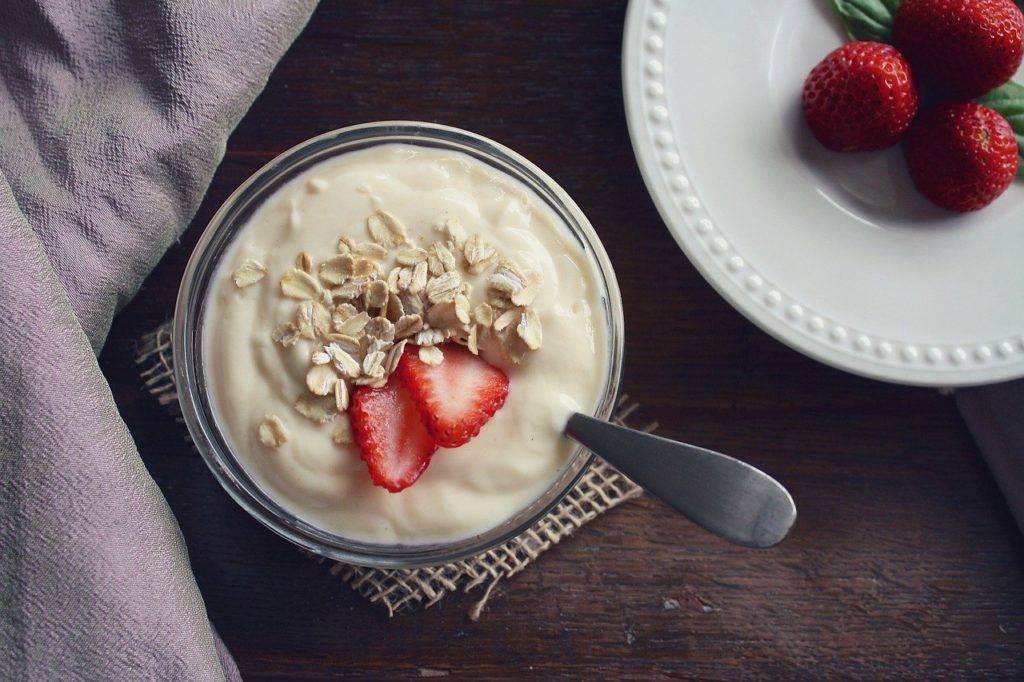
Table of Contents
Curd Calories – How Many Calories Does Curd Have?
Do you know about curd calories? Did you know that curd has more calories than milk? A cup or 128 grams of fat-free curd contains 100 calories whereas milk has 90 calories. However, the protein content in curd is more than milk which is 11 grams as compared to milk that is 9 grams.
- Calories in homemade curd (1 cup) made with cow’s milk has 142 calories.
- 100 grams of plain, unflavored, whole milk curd has 61 calories.
- The calorie count of curd varies according to the type of milk used to set the curd. Of course, curd made with full fat milk will have more calories.
The Good Bug Metabolically Lean SuperGut Powder | HRX |Probiotics + L-Carnitine | Boosts Metabolism & Reduces Cravings |6X Probiotic Activity | For Men & Women | 15 Days Pack
Quick Recipes with Curd: Get a good refreshing kick to your tastebud.
The Dahi Review – We picked brands commonly and easily available across major cities. After several trips to local supermarkets, kiraana stores and online stores, we picked up 9 curd brands. After tasting them and using the curds to set homemade curd, we reached a conclusion. Read our review of the ‘Best Packaged Dahi’ to know more.
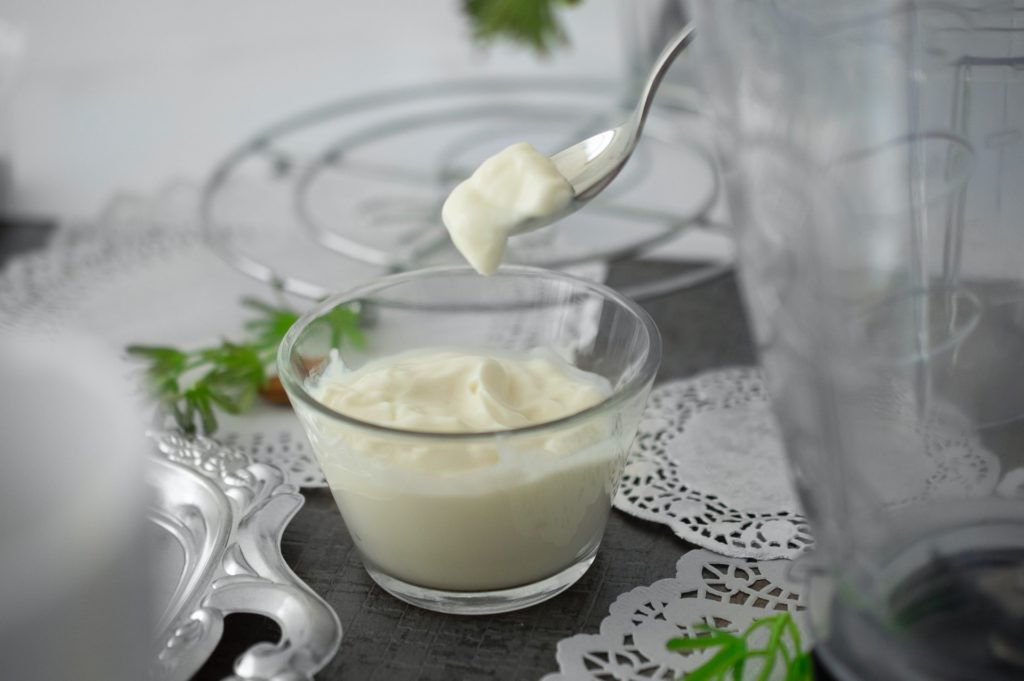
Nutritional Content Of Curd
Nowadays people are more aware of what they are eating and about its nutritional content also. As we said earlier that curd is a very crucial part of every Indian diet so it’s important for people to know about curd calories. As per USDA, the nutritional value per 100 grams of curd is as follows :
Nutrients |
Amount (100 Grams Of Plain Whole Milk Curd) |
| Calories | 61 KCal |
| Water | 81% |
| Carbohydrates | 4.7 grams |
| Protein | 3.5 grams |
| Fat | 3.3 grams |
| Fiber | 0 grams |
1. Protein
Besides the calories in curd, the amount of protein in curd is close to 10-12 grams depending on the type of curd.
A protein-rich diet is necessary for our body’s growth and development. Sometimes, commercially sold curds have a high protein content in comparison to homemade curd because of the addition of dry milk during curd processing.
Whey or casein may be used depending on the solubility in water. Plenty of casein in the form of alpha- casein is present in curd, which is around 80% of protein. It is due to this particular variety of protein in curd that gives it a white color appearance. It is very beneficial in mineral absorption, such as calcium and phosphorus, which further improves low blood pressure.
You must have heard about whey protein that’s especially recommended for athletes and bodybuilders. 20% whey is found in curd protein, high in branched-chain amino acids (BCAAs) valine, leucine, and isoleucine. It greatly helps in weight loss and maintaining blood pressure.
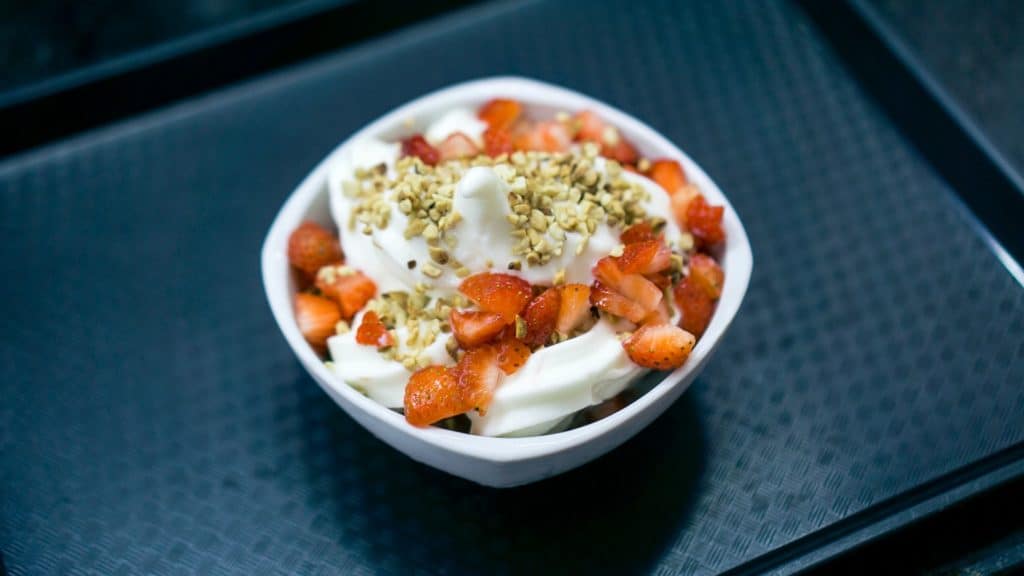
2. Carbohydrates
Time for a small biology class! Curd carbohydrates are mainly simple sugars known as lactose (milk sugar) and galactose. The fermentation of bacteria breaks down the lactose and produces glucose and galactose that further converts in lactic acid which is responsible for the sour taste of curd and other fermented dairy products.
Curd contains fewer carbohydrates than milk, which makes it an excellent element for a keto diet. Usually, carbohydrates constitute only three percent of the calorific value of curd, making it an excellent food for people who are on a diet.
Sweet and flavored yogurts are much popular these days, and they contain sucrose (white sugar) with different kinds of fruit flavors. The sugar content of these yogurts can be 4.7 to 18.6% or even higher, which is not considered healthy if consumed on regular basis.
3. Water
Around eighty percent of this dairy product is water. This is why curd is often eaten during summers, where there are high chances of suffering from dehydration. A glass of buttermilk or lassi can give instant energy boost and rehydration.
4. Vitamins
The vitamin content of yogurt also depends on the type of milk used to set the curd and the bacteria used in the process of fermentation. Whole milk is a good source of vitamins.
Related Reading:
Know everything about the vitamins present in curd.
1. Vitamin B12
As an excellent source of vitamin B12, curd is crucial for our diet (especially for vegetarians) as B12 is generally found in fish, meat, and poultry. Vitamin B12 is required to keep the body’s nerves and blood cells healthy. It also helps prevent megaloblastic anemia.
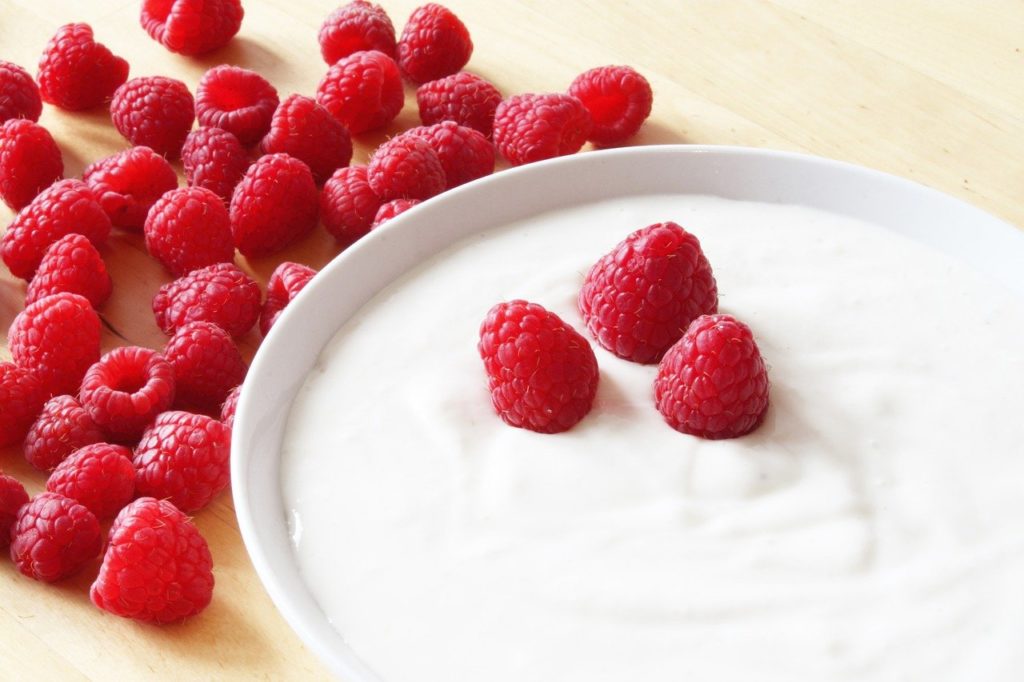
2. Vitamin A
Curd contains 2% of Vitamin A. Vitamin A is an essential vitamin for our body as it accelerates cellular communication. It also helps in vision, reproduction and boosts immunity.
3. Vitamin C
We often hear from our parents about applying curd on the face for better glow and even on the scalp as it helps make hair strands stronger and glossy. This is because curd works great as it contains Vitamin C.
Vitamin C helps in boosting the immune system and also encourages the formation of collagen.
5. Minerals
Amongst the mineral content of curd, the two major mineral groups that will benefit you are potassium and calcium. However, the proportion of these two minerals is less in curd as compared to that of milk.
1. Calcium
Curd is rich in calcium which the body can absorb easily. Calcium is required for strong bones and teeth. Furthermore, it helps in blood clotting and muscle contracting.
2. Potassium
Amongst the two major mineral groups, potassium is one of them. Potassium in our body helps the nervous system to function properly and helps muscles to contract. It also helps in transporting nutrients into cells and also removes toxins from the cells.
3. Zinc
Zinc is the necessary mineral in our body. Our body cannot make zinc on its own. Curd has a small amount of zinc present in it. Zinc improves the immune system, helps in DNA synthesis and aids in growth.
4. Phosphorus
Curd contains a good amount of phosphorus that’s helpful in biological processes of the body like growth, repair and maintenance of the cells and tissues.
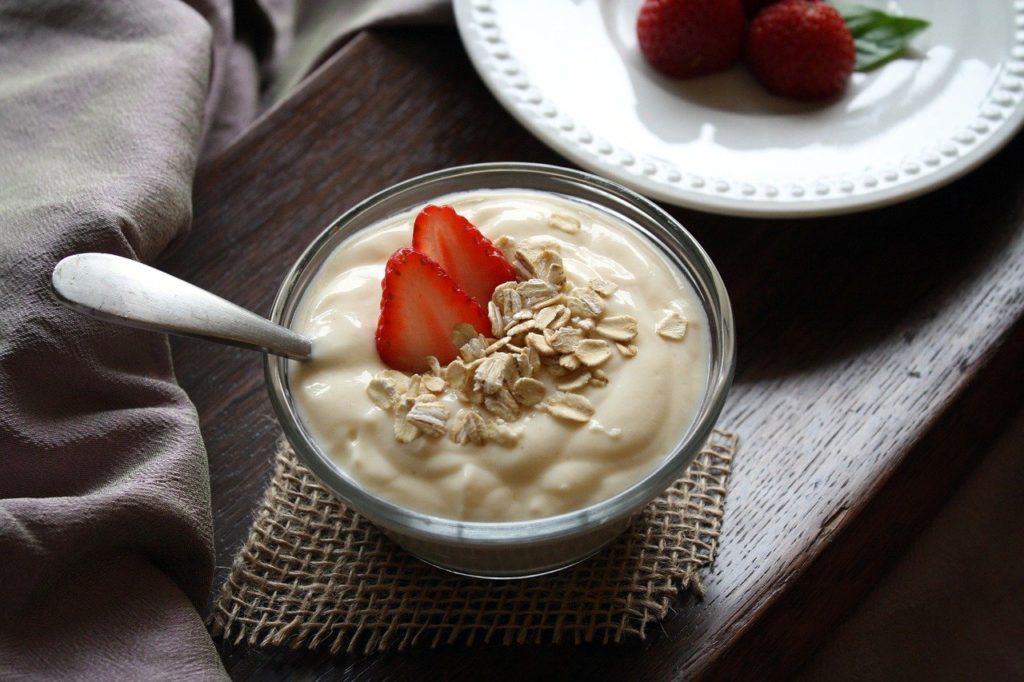
6. Riboflavin
Curd is the major source of riboflavin. It helps in breaking down carbohydrates, fats, and protein to produce energy. Riboflavin helps in overall growth and maintaining good health.
7. Probiotics
Probiotics are live and good bacteria that include lactic acid and bifidobacteria. Probiotics are beneficial in smooth digestion, stomach ailments, lowering cholesterol levels, diarrhea, and lactose digestibility.
Always choose yogurt/dahi with active and live cultures. The main bacterial cultures in yogurt are Lactobacillus bulgaricus and Streptococcus thermophilus. These cultures help ferment the curd. In some cases (probiotic curds) other bacterial cultures might be added as a probiotic.
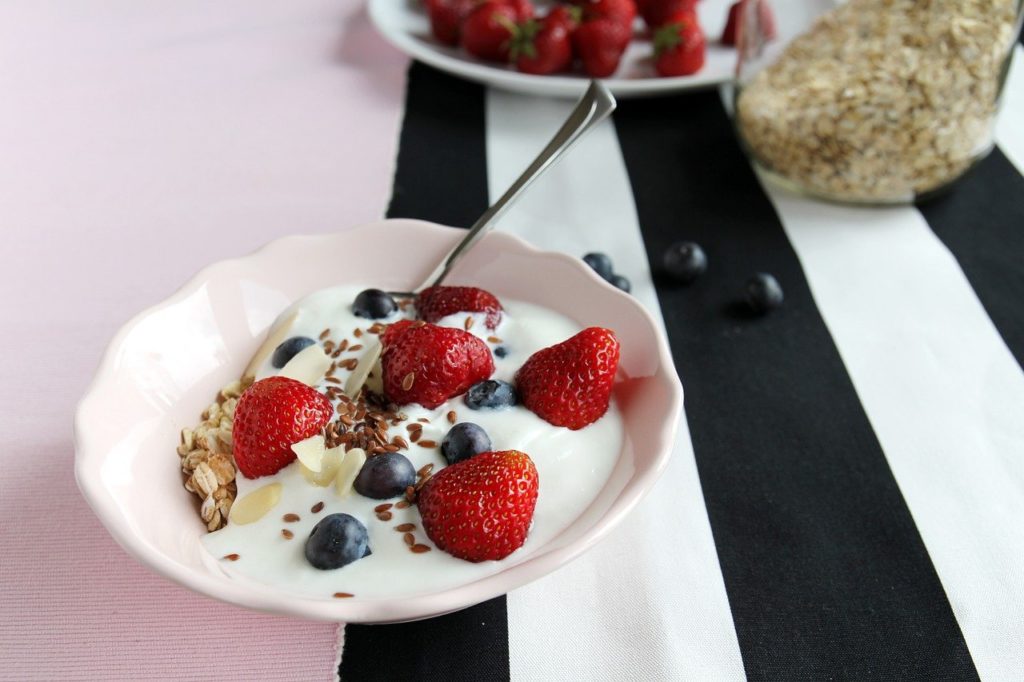
8. Lactic Acid
Another essential component of curd is lactic acid. When you add the acidic element in milk, two different bacteria named lactobacillus bulgaricus and Streptococcus thermophilus act on the fats and proteins and break them down. During the curdling process, the milk lactose is converted into a more digestible form known as lactic acid.
9. Monosaturated Fatty Acids
Three major types of monosaturated fatty acids are present in curd: oleic acid, stearic acid, and palmitic acid. The presence of these fats makes curd nutrition best for everyone, starting from children to elderlies.
How To Make Curd At Home?
Most Indians love to eat homemade curd as calories in homemade curd are healthy additions to the diet. Homemade dahi is fresh and delicious also. To set homemade dahi, it’s essential to follow the steps correctly. You can follow the below points to set curd at home.
Ingredients Required
- 2 cups of milk
- 1 tsp curd
Preparation Method
- Boil the milk and let it cool for a while.
- Whisk the curd in a bowl, add the warm milk and stir well. Make sure the milk is not too hot as it might lead to the curd not setting.
- Cover and let it sit for 5-6 hours. If the weather is cold, the curd might take around 10-12 hours to set.
- It is recommended to keep the curd in a warm, dark place like an oven or a casserole during colder months.
- You can read more about how to set curd at home the right way.
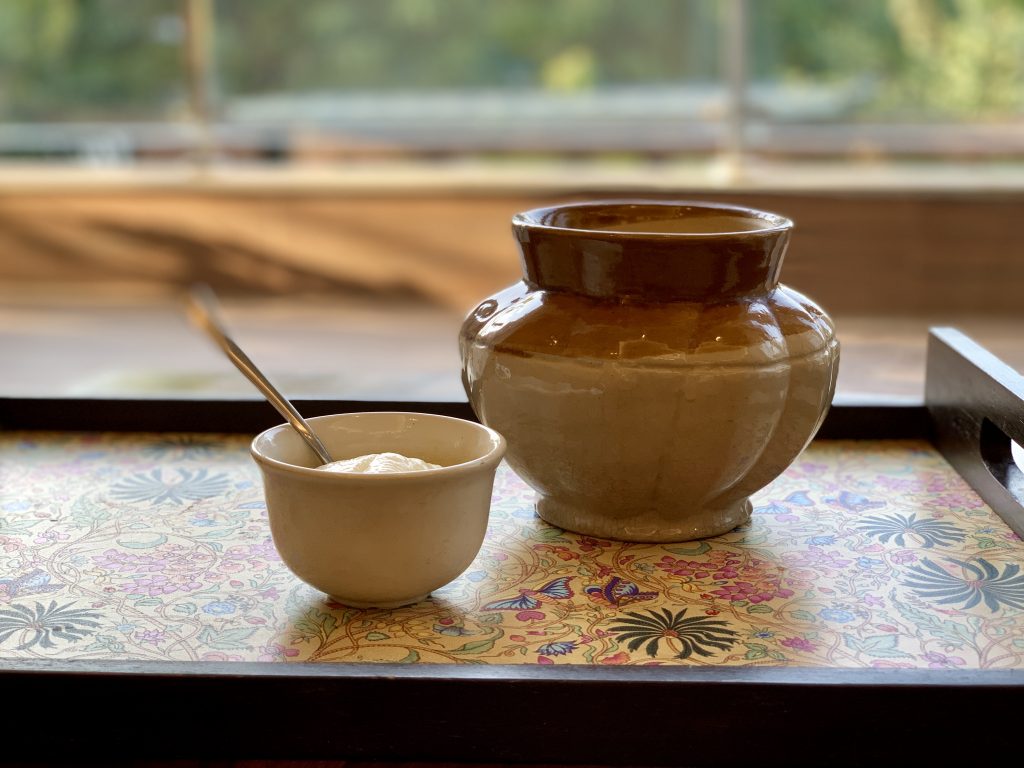
Also Read : We Reviewed Tastiest Mishti Doi In Our Review Lab. Check It Out.
Things To Remember While Setting Homemade Curd
Sometimes curd doesn’t set correctly for many reasons like adding the starter to boiling milk etc. Few things to keep in mind while setting homemade curd.
- Don’t boil milk.
- Never add starter milk to hot milk. Let it cool down.
- Add the right amount of curd to milk.
- In winter, cover the bowl in which you have set curd with a kitchen towel so that curd set properly.
- In winter, curd doesn’t set easily, so it’s important to give warmth to the bowl you have set curd.
Benefits Of Curd
The benefits of curd are numerous, and it is imperative to include healthy calories of curd in your diet. Adding healthy calories to your diet can be very beneficial for your health.
There are many curd benefits if you add it the right way.
1. Helps In Improving Digestion
Ever wondered why doctors suggest curd if you have an upset stomach? Probiotic-rich curd is helpful for digestion and relieving stomach problems. Curd with probiotics is helpful for managing diarrhea.
According to a study conducted on 766 children, probiotics can reduce the AAD symptoms along with some medication. Furthermore, probiotics may ward off the lactose intolerance symptoms through promoting lactose digestion. Probiotics with bifidobacterial can ease IBS symptoms and helps relieve constipation too. (1)

2. Helps In Maintaining Blood Pressure
High blood pressure or hypertension is a chronic condition that may result in heart diseases. Being rich in potassium, curd helps in flushing out the excess salt from the body. A study done on 702 participants shows that probiotics are helpful in reducing blood pressure as compared to a placebo. A bowl of curd every day may help regulate your blood pressure along with the other benefits of curd nutrition. (2)
3. Promotes Bone Health
We all remember our mothers running after us with a glass of milk, and convincing us to have at least one glass every day. Being a milk product, the curd is exceptionally rich in calcium and protein that aids bone health. As we grow older, our bones start losing calcium which results in weak and brittle bones that eventually leads to osteoporosis, especially in women. Curd is helpful in preventing this chronic disease as well as bone fractures. A study says that a calcium and protein-rich diet can help increase bone density also. (3)

4. Aids In Weight loss
According to the American Dietetic Association curd works as an excellent fat burner. Being rich in calcium and protein, curd helps in losing weight. It keeps you satiated for long and keeps unnecessary cravings at bay. Furthermore, protein helps in getting lean muscles with reduced body fat.
Probiotics are good bacteria that are helpful in the assimilation of nutrients from food. Probiotics are known for improving digestion and stimulating metabolism. A study found that curd reduced the BMI and body weight in healthy, obese, and overweight people.
Isn’t it a good idea to lose some weight with rich taste but low Dahi calories?
5. Helps In Constipation
Curd benefits are very helpful in constipation. Curd contains lots of good bacteria, and these good bacteria give you relief from constipation. Curd is very beneficial in keeping your digestive system healthy. It is said that ‘if your stomach is healthy, your whole body is healthy. If you want to add curd in your diet for constipation purposes only, seek expert advice also.
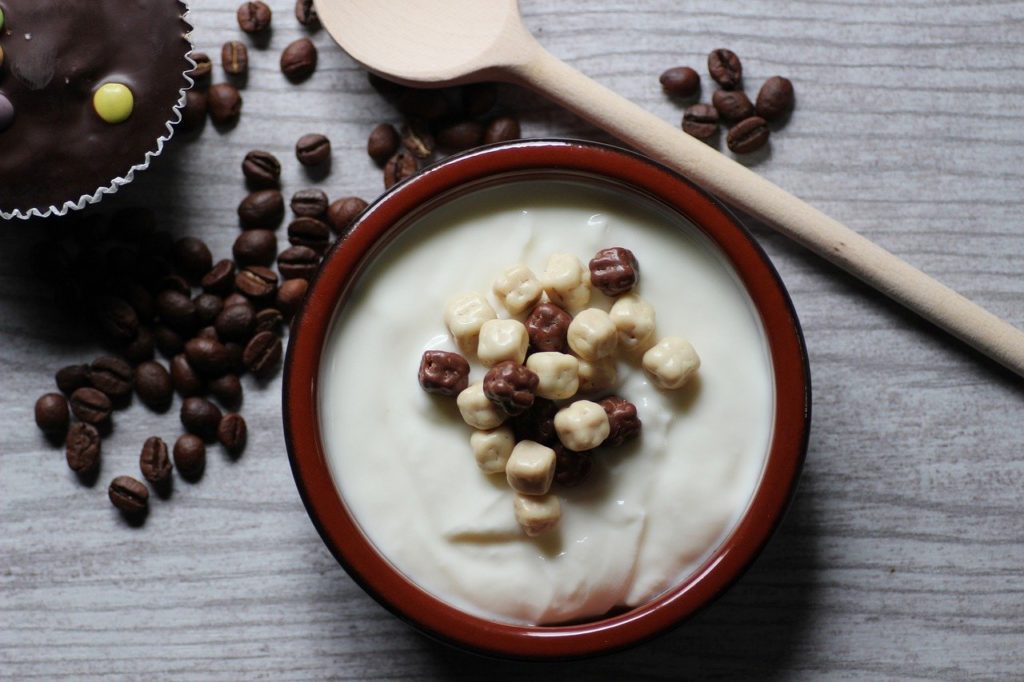
6. Helps To Build Strong Immunity
The benefits of curd are very popularly known for making immunity strong. If it is possible, always try to eat homemade curd. Curd is full of good bacteria, which makes immunity stronger. To make immunity stronger, it is a good habit to include curd in your diet.
Related Reading:
Curd improves skin health. Read here all the benefits curd offer in enhancing skin.
Curd Side Effects
As we have seen, there are many curd benefits, which can be obtained only when taken in the right way and the right amount. If you want to have maximum curd benefits, it’s equally important to know curd side effects.
Some people may have to face curd side effects because of reasons stated below:
1. Lactose Intolerance
Curd has less lactose as compared to milk because most of it breaks down in glucose and galactose and most lactose-intolerant people can consume it. But some may still not be able to tolerate it well, therefore it’s better to avoid curd in such cases.
2. Milk Allergy
Milk allergy is rare but it’s prevalent in many children and not too common in adults. A person suffering from milk allergy can’t digest milk proteins such as whey and casein and starts showing some immediate allergy symptoms like hives, wheezing, coughing, shortening of breath, vomiting after consuming milk. Milk and milk products must be strictly avoided during milk allergy.
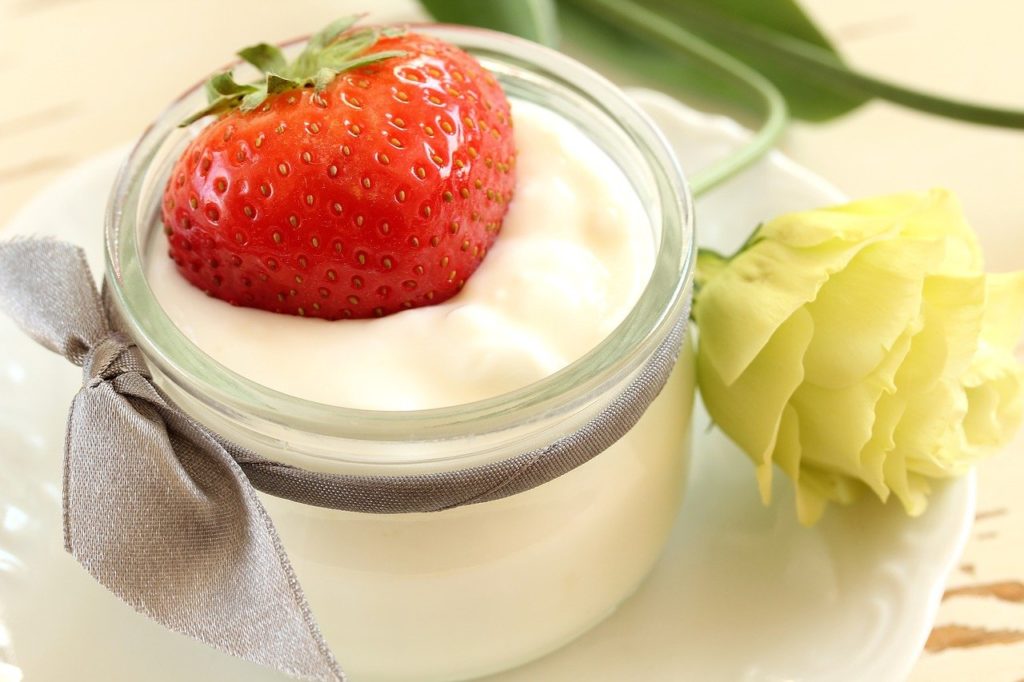
3. Added Sugar
Even many low-fat curds can contain lots of added sugar that can cause chronic diseases like diabetes, heart problems. Always check the label for ingredients like sucrose, corn syrup or fructose, which are commonly disguised as refined sugar. If possible, go for plain homemade curd for regular consumption.
Frequently Asked Questions
As seen above, the benefits of the curd are immense. Consumption of it in an adequate amount is enough to see positive change in one’s life. Also, we are here to answer a few of the frequently asked questions by our readers.
1. Does curd cause weight gain or makes you fat?
Contrary to popular belief, curd does not cause weight gain, in fact, it is great in weight loss. It contains Calcium which aids in weight loss. Some studies have claimed that Calcium may help boost thermogenesis, which in turn helps boost metabolism.
2. Can I have curd If I am allergic to milk?
Most people who are allergic to lactose can digest curd and suffer no allergic reaction to it. Being lactose intolerant means that you may body is unable to break down lactose–a milk sugar–in the gut. The body’s inability to break this down leads to symptoms such as bloating, gas, and abdominal discomfort.
3. How much fat does curd have?
As per the USDA facts, 100 grams of curd have about 4.3 grams of naturally occurring fat. These fats are extremely harmless and healthy.
4. Does curd help in weight loss?
Eating curd in right amount can be helpful in losing weight. Curd is full of nutrients and these nutrients can help in burning fat. Many studies have also shown that curd may aid in weight loss.
5. How many calories are there in a single bowl of curd?
100 grams of plain whole milk curd contains 61 Calories.
6. What is the best time to have curd?
According to Ayurveda, except night every time is a good time to eat curd. Try to avoid eating curd at night as it make cause some kind of issue. Also try not to add sugar in your healthy curd.
7. Can we eat curd daily?
Curd can be eaten daily in right amount. It helps in managing cholesterol, blood pressure, weight etc. Eating the right amount of curd at the right time can be very beneficial.
8. What are the side effects of curd?
People who are lactose intolerance should avoid curd. Also, people having milk allergy should also avoid curd.
Final Words
Delicious to taste, the curd is a nutrient-dense food. Curd is a milk product that’s made through the process of fermentation. Rich in calcium and protein, the curd is an important part of our diet. The amount of curd calories depends on the type of curd, and the milk used to set the curd.
Curd prepared with healthy and live bacteria is healthy for consumption. It’s capable of preventing some chronic illnesses like blood pressure, osteoporosis, and obesity. The nutrition in dahi is high, therefore it must be added to your diet for several health benefits. People with lactose intolerance must be careful and curd should be avoided during milk allergy.
Disclaimer – This content including advice provides generic information only. It is in no way a substitute for qualified medical opinion. Always consult a specialist or your own doctor for more information before making any dietary changes.













